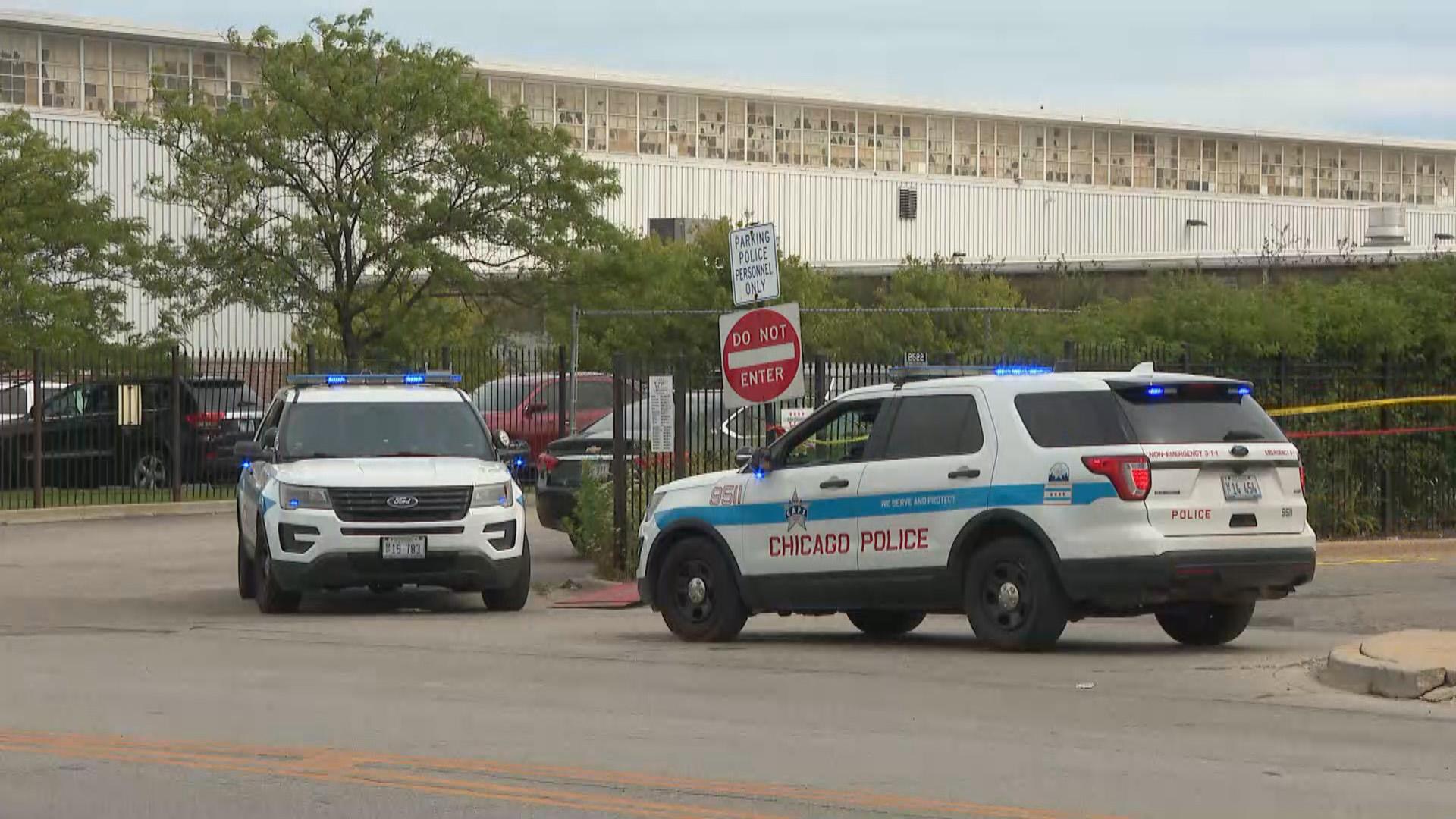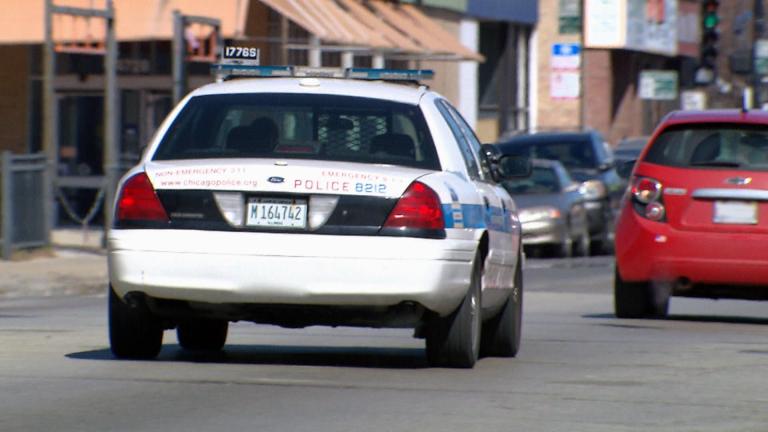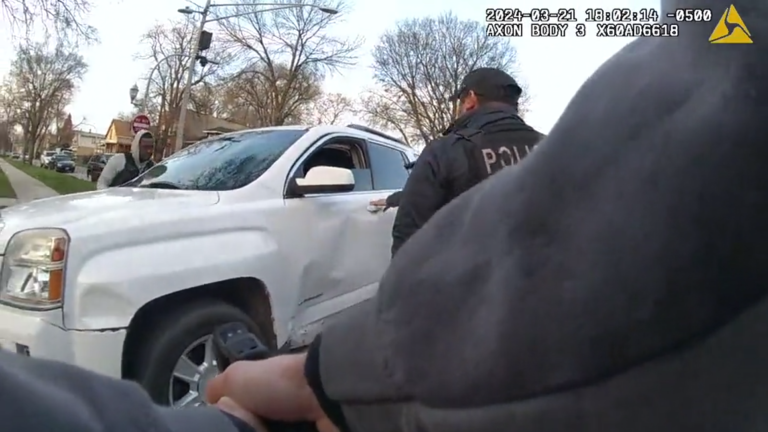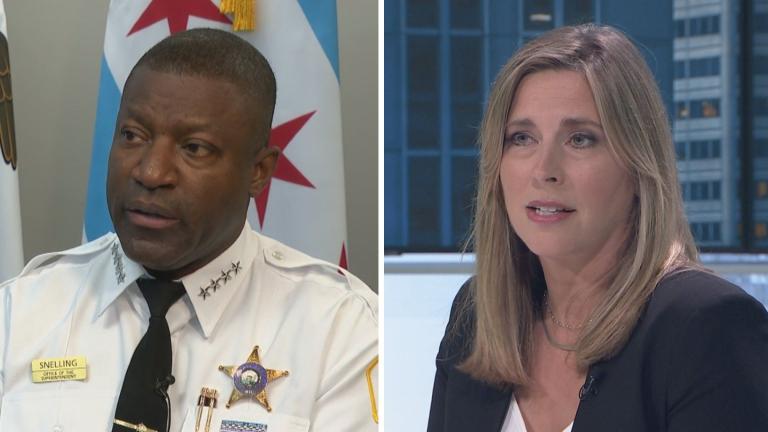 (WTTW News)
(WTTW News)
Mayor Lori Lightfoot and two of her closest allies on the Chicago City Council remain at odds over long-stalled efforts to put an elected board of Chicago residents in charge of the Chicago Police Department.
While 30 aldermen support the measure crafted by a coalition of community organizations under the umbrella of the Grassroots Association for Police Accountability, known as GAPA, such a substantive piece of legislation would be unlikely to pass without the support of the mayor.
Ald. Roderick Sawyer (6th Ward) and Ald. Harry Osterman (48th Ward) — the leading sponsors of the plan to create an elected board — nevertheless vowed to push for a vote on the measure, setting up a showdown with the mayor, who is under increasing pressure to revamp how the Chicago Police Department is funded and how officers are held accountable for misconduct.
The dispute centers on whether the Community Commission for Public Safety and Accountability — a seven-member panel included in GAPA’s proposal — would have the final say on policy disputes between the police department and its two oversight agencies.
While Lightfoot wants to have the power to resolve any decisions, the proposal from GAPA would give the ultimate decision-making power to the commission.
That’s crucial to encourage collaboration and ensure that Chicagoans trust the city’s police department and the criminal justice system, Osterman said.
Aldermen on Tuesday spent more than four hours discussing the proposal but took no action.
Lightfoot’s office said in a statement that they plan to introduce a revised measure in the “near future.”
“Since day one, Mayor Lightfoot has been clear that implementing civilian oversight over the Chicago Police Department is an essential component for building greater transparency, accountability and trust between our law enforcement and the residents they serve,” said Lightfoot spokesperson Pat Mullane. “As part of that effort, the city is drafting an ordinance to establish a civilian oversight body that is committed to making our neighborhoods safer by not only increasing accountability but also ensuring community members have a voice at every level — from local police districts to leadership across our public safety agencies.”
While she was president of the Chicago Police Board, Lightfoot led the Police Accountability Task Force formed by then-Mayor Rahm Emanuel in the wake of the outcry caused by the 2014 murder of 17-year-old Laquan McDonald by a police officer. The 2016 task force’s first recommendation was to create a “Community Safety Oversight Board, allowing the community to have a powerful platform and role in the police oversight system.”
Even though Lightfoot joined GAPA organizers to unveil the coalition’s first proposal for an elected oversight board, she said Sept. 29 that she was “moving on” from the coalition after disagreeing with members about the power of the commission to set policy, its budget and whether it could trigger City Council hearings and action with a no-confidence vote in the superintendent and head of the Civilian Office of Police Accountability.
Although he initially supported giving the coalition the final say on policy, Taliaferro told the Chicago Sun-Times he had changed his mind and would vote to give the mayor the ultimate authority to make policy for the police department.
However, during Tuesday’s hearing Taliaferro said disputes between the mayor should be resolved by an arbitrator, or a neutral third party.
Osterman said Tuesday that an elected oversight board was the “critical missing step” in police reform.
Lightfoot picked Sawyer to chair the Health and Human Services Committee, and she tapped Osterman to lead the Housing and Real Estate Committee. It is rare for committee chairs to publicly criticize the mayor.
Supporters of an elected police oversight board hoped the push would get new life after the police killing of George Floyd touched off nationwide protests, but Lightfoot left that proposal off a list of reforms she introduced and vowed to implement in 90 days. Despite the outcry, Chicago has not made any changes to the way the police department operates, or holds officers accountable for misconduct.
While a majority of aldermen support the proposal crafted by GAPA, several aldermen support a proposal known as CPAC that would give an elected board the power to hire and fire the superintendent. Lightfoot has rejected that proposal as too far-reaching.
Ald. Carlos Ramirez-Rosa (35th) — the lead sponsor of CPAC — warned committee members not to let groups like the Fraternal Order of Police, which opposes an elected board, to “bully us into watering it down.”
However, Ald. Andre Vasquez (40th) warned his colleagues who support the proposals from CPAC and GAPA not to let the mayor exploit their differences, ensuring that the final result has only marginal support among aldermen and Chicagoans.
Other aldermen totally object to the creation of an elected board. However, the federal consent decree governing the operations of the Chicago Police Department requires the creation of an elected oversight board.
GAPA’s proposal would create a seven-member Community Commission for Public Safety and Accountability. It would not have the power to hire or fire the police superintendent, chief administrator of the Civilian Office of Police Accountability or to select members of the Police Board.
Instead, it would send “a short list of candidates” developed by the commission for those top jobs to the mayor for her selection. If the mayor rejects all of the recommendations, the commission must generate a new list, according to the proposal.
All must be approved by the City Council.
GAPA’s proposal would also create councils in each of the city’s 22 police districts, made up of three elected members and several unelected members “to ensure engagement of the full community.”
One elected member from each district council would serve on a committee to nominate two candidates for each seat on the Community Commission. The mayor would pick from the two finalists, and that selection must be confirmed by the City Council, according to GAPA’s proposal.
A majority of the Community Commission members “will be selected based on their expertise in areas like civil rights, social work, work with immigrant and undocumented communities, and law,” according to the proposal.
Two of the seven commissioners must be between the ages of 18-24 and have experience with police misconduct, according to the proposal. That was a key demand of activists pushing for civilian oversight of the police.
Contact Heather Cherone: @HeatherCherone | (773) 569-1863 | [email protected]








